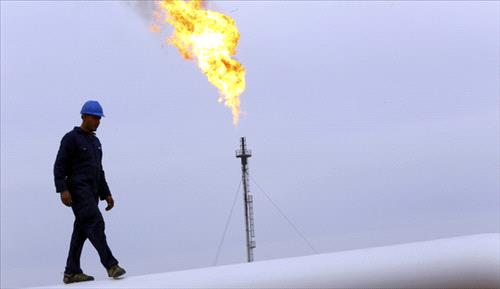Ammon News - AMMONNEWS - After Jordan’s parliament approved the 2014 general budget in January, Prime Minister Abdullah Ensour said the country’s main economic problem was the energy sector, describing it as a “horrible disaster.” Energy costs Jordan 4 billion dinars [$5.6 billion] in imports per year, which is equal to half of the general budget (nearly 8 billion dinars) [$11.2 billion]. The dilemma has pushed him to stress, “The Iraqi [oil] pipeline has become a necessity, and must be quickly carried out Al-Monitor Published on Monday.”
Jordan used to rely on an Egyptian gas pipeline for the production of 80% of its electric power. However, the frequent interruptions caused by successive bombings of this pipeline in Egypt, and the reliance of the state-owned national electric power company on imported crude oil, have led to a debt exceeding $7 billion in the last three years, including the cost of the subsidy policy and the declining gas quantities coming from Egypt. Every time the supply is halted as a result of the frequent interruptions caused by the bombing, it costs the Jordanian treasury $1 million per day.
Jordan and Iraq signed an agreement in April 2013 to build a pipeline to carry 1 million barrels of oil per day from the Iraqi city of Basra to the Jordanian city of Aqaba on the Red Sea. The 1,700-kilometer [1,056-mile], $18-billion pipeline will be completed in 2017. Iraq will handle all the costs and the entire project will be the property of the Iraqi government. The two sides have held meetings and both have carried out discussions with qualified companies. Jordanian Minister of Energy and Mineral Resources Mohammad Hamed expected the tender for the execution of the project to be launched in the second quarter of 2014 and prior to this coming June.
It is one of the mega projects that will promote economic ties between the two countries. For Iraq, the project will help increase oil exports and diversify outlets, with a new terminal on the Red Sea. This comes as part of Iraq’s massive plan to produce 9 million barrels of oil per day by 2017. For its part, Jordan will meet its oil needs with an average 150,000 barrels per day. It will also be able to use the Arab gas pipeline to carry imported liquefied natural gas (LNG) by sea, to fully meet its power plants’ needs. In addition, a passage tax might generate an income ranging between $5 million and $10 million per day. Implementation stages will provide Jordanians with nearly 3,000 job opportunities.
Egypt signed two agreements with both countries on March 6, 2014. The first stipulates that natural gas is transferred via the Arab gas pipeline, while the second is designed to connect the pipeline to import LNG to the gas pipeline that is between the Ministries of Energy and Mineral Resources and the national electric power company on the one side, and the Jordanian Fajr Company on the other.
Thus, the oil pipeline network gradually finds its place back in the region, and the importance of the Iraqi pipeline is highlighted through the development of strategic ties and the intersection of common interests among beneficiary countries. However, the Israeli role in this field cannot be ignored, especially in light of the expected geopolitical developments and its ambitions to share Arab wealth. History bears witness to the repeated attempts to exploit opportunities Israel considers available, and to the security developments of repeated wars and aggressions.
In 1946, Britain built two oil pipelines from Iraq to the port city of Haifa. The first starts from Mosul and goes to the Palestinian port, and the second passes through Jordan to Palestine. In the same year, Britain developed a project for an oil pipeline stretching from Saudi Arabia to Palestine (the Trans-Arabian Pipeline or Tapline). The project was not implemented until 1950, after altering its path through the Syrian Golan Heights to the Az-Zahrani terminal in southern Lebanon, because the State of Israel was established in 1948. For the same reason, Arab oil was no longer pumped from Iraq to the port of Haifa.
In 1967, after Israel occupied the Golan Heights, the Tapline — which was an outlet for the export of large quantities of Saudi oil to global markets — was closed. It remained closed for a while, until it was allowed, with US approval, to pump small amounts to the Lebanese Az-Zahrani refinery. Israelis bitterly looked on as this occurred until 1982, when their forces destroyed the refinery during the Israeli invasion of Lebanon.
Until the early 1980s, the small oil pipeline stretching from Kirkuk to Syria down to the Tripoli refinery in northern Lebanon had continuously operated, before halting its activity during the Iraq-Iran war. It resumed its activity in 2002, but it reached only to Syria.
Since Iraq was occupied in 2003, Israel’s oil dream has grown bigger, including the revival of the Mosul-Haifa oil pipeline that was closed in 1948. The Israeli government has even planned to control southern Iraq. Under the agreements that were signed with Egypt, Israel received quantities of oil and gas. However, the pipelines were damaged by the frequent attacks following the overthrow of President Hosni Mubarak. Thus, the flow of gas has stopped to Israel, which is demanding that Egypt provide compensation.
It should be noted that the gas agreement signed between US Noble Energy and Arab Potash Company to supply 2 billion cubic meters [2.6 billion cubic yards] of natural gas to Israel for 15 years is the beginning of new Israeli plans that will be implemented under the auspices of the United States as part of the reconciliation treaty the United States is seeking. The plans include a comprehensive geographic and economic review of the region, including safe corridors and oil pipelines as privileges of the four concerned countries and beneficiaries — namely Israel, Palestine, Egypt and Jordan.
